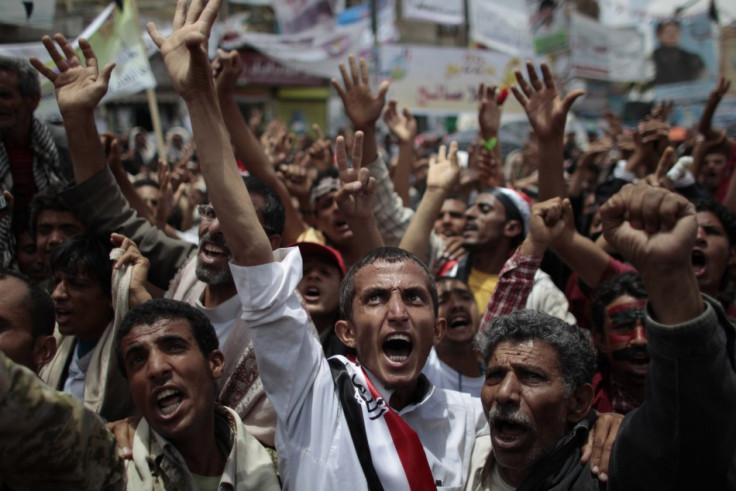Yemen deal broken: A slow slide into civil war?

Relief could be felt and hope expressed after the Yemeni President Ali Abdullah Saleh announced that he was willing to sign a transition deal. However, on Wednesday and despite Washington's insistence on the necessity of a deal being signed so Yemen could "move forward immediately" with political reform, the agreement fell through. It seems that unhappy about certain details, the Yemeni president backed out of a deal that would have granted him immunity from prosecution and allowed him a dignified exit from power in the Arabian Peninsula state he has ruled for nearly 33 years.
Political analysts had doubted whether the deal, which would have helped qualm the anti-Saleh street protests that have paralysed Yemen's economy, would actually be carried out as two previous near-deals also fell through at the last minute.
"I won't believe it until I see it, that's what we learned in Yemen ... Everyone thought that the deal was done a few weeks ago but Saleh found a way to back out in the final hours and days." said Shadi Hamid, analyst at the Brookings Doha Centre.
"Saleh is notoriously stubborn. If he signs, maybe we'll actually see a conclusion to the crisis in Yemen and that's what people have been waiting for," Hamid continued.
As the situation in Yemen becomes even more complicated, it is becoming clear that something must be done to prevent the country from spiralling into civil war. With a fragile economy and distrust within the country's institutions and main political characters running wild, Yemen certainly is the one to watch in the peninsula.
Yemen is located in the Arabic peninsula, surrounded by the Gulf Cooperation Council (GCC) countries which include Bahrain, Saudi Arabia, Kuwait, Oman, Qatar, and the United Arab Emirates. The first thing to point out with Yemen is that its per capita domestic product (GDP) at less than $1,000, is 40 times lower than the average per capita GDP for the GCC countries. With nascent political instability and a dwindling economy, the disparity between Yemen and its neighbour is set to increase in the next few decades, leaving the country in a very fragile position.
Public resentment over the endemic corruption problem that has plagued the country for many years is not a novelty. However in January 2011, thousands of protestors took the streets of the capital Sana'a and other provincial cities and started a non-violent pro-democracy movement which is still active in its fifth months of protests.
The main demand coming out of the demonstration is clear: people want President Ali Abdullah Saleh to step down immediately, following his 33 year reign of the country. The proposition of a phased transition that would see the president leave after an interim period including constitutional change was at first badly received by the protesters who insist on the immediate departure of the leader.
In the last few months, Yemeni people have been known to use streets protests to voice their distrust of the Saleh regime. However, popular discontent is also much deeper, with protests also being directed at the opposition and the parliamentary framework. With the government's structures and institutions only partially efficient, throughout the years, the elite acquired more and more power while becoming less and less accountable.
Another worrying fact is the important role played by the army as in the case of Yemen it does not constitute a homogenised bloc solely standing behind the president but is rather divided into several factions that oppose and distrust each other. As a result Yemen is becoming a country where the only point that everyone agrees on is the will to contest the legitimacy of the other group, reducing the country to a space where the predominant actor is in fact becoming protest itself.
Besides, a consequence of the popular unrest that is too often overlooked by the media is that while the international community is focused on the Yemeni president and trying to organise his exit, the cracks and long standing competition that divide the ruling elite are now for everyone to see. The first indication of the schism came with the official announcement in March from Ali Mohsin Al Ahmar, the commander of Yemen's North Western district, who decided to shift his loyalty to the opposition. A wave of defections followed Al Ahmar's statement, but despite popular unrest and a domestic list of allies that is becoming thinner by the day, Saleh seems determined to cling on to power for a bit longer.
The army is now imploding from the inside with generals forming different alliances with numerous dissident groups. One of the main risks deriving from the president's refusal to leave, thus paralysing the entire country, is the creation of a stalemate leading the dissident groups to confront each other, plunging the country into a civil war.
The GCC countries proposed a series of initiatives inciting the president to accept a transition deal in the hope that it would stop the situation from mounting into a full scale civil war that would have disastrous consequences on the region.
It is however not the first time that Yemen is in the headlines as its alleged Al Qaeda franchise, considered as one of the most active bases of the organisation, has been the focus of much international debate in recent years. It seems that between the threat and implications of terrorist activity, protests over the government's competence and an internal conflict opposing the northern 'Houti' rebels and the southern separatists, Yemen's problems might take more than the president's departure to fix.
The country's economy should be for now the main focus of the talks as a new government will have to deal with decreasing oil production and foreign investment. In addition than a third of the population remains undernourished, land disputes further dividing the population are still a recurrent and water resources are proving more precarious.
All is not well in Yemen.
© Copyright IBTimes 2025. All rights reserved.





















